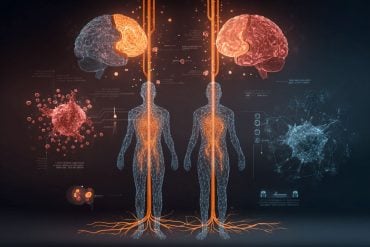Summary: Researchers report rats that ate fatty or junk foods during pregnancy tended to have heavier pups that preferred the taste of fat directly following weaning. They also noted mothers who ate energy rich food either during pregnancy or while breastfeeding had an increased risk of their children becoming obese later in life.
Source: Frontiers.
Researchers in France found that rats who ate a junk food diet during pregnancy had heavier pups that strongly preferred the taste of fat straight after weaning. While a balanced diet in childhood seemed to reduce the pups’ desire for fat, they nevertheless showed altered brain reward circuitry into adulthood.
The Western diet is full of energy-rich foods — from hamburgers to chocolates, we consume significant quantities of fat and sugar. The health costs of this are well known, and conditions such as obesity and diabetes are related to overeating.
Factors underlying obesity include how we metabolize food, and our tendency to overeat and seek out energy-rich foods. The pleasure we derive from food stems from the brain reward circuitry, and changes in these reward circuits can contribute to overeating.
Surprisingly, pregnant or breastfeeding mothers who eat significant quantities of energy-rich foods can increase their child’s risk for obesity in later life. However, scientists don’t yet fully understand the mechanism behind this phenomenon.
In a study recently published in Frontiers in Endocrinology, scientists used rats to investigate the relationship between a mother’s diet and their offspring’s weight, relationship with food, and brain circuitry. The research team fed rats a high fat/high sugar diet (which they called the ‘Western Diet’), or a balanced diet, during pregnancy and suckling. They monitored the mothers’ pups straight after weaning, during adolescence and into early adulthood.
The pups primarily ate a balanced diet once they were weaned, but at specific times the researchers allowed some of the pups to choose between tasting a fatty or non-fatty liquid. The liquid wasn’t fatty enough to affect the pups, but allowed the team to assess their preference for fat. Using brain tissue samples, the team also investigated gene expression and brain changes associated with the pups’ reward circuitry.
While the pups from Western Diet mothers were a normal weight at birth, they gained more weight during suckling and were abnormally heavy at weaning. This may have been caused by the Western Diet mothers producing richer milk or more milk.
When the team allowed the just-weaned pups to choose between a fatty and non-fatty liquid, pups from Western Diet mothers strongly preferred the fatty liquid compared with pups from the balanced diet mothers.
However, when the team repeated this fat preference test with adolescent pups, they found that both groups showed a similar high preference for fat — and interestingly, the pups from Western Diet mothers gradually lost their interest in fat after a few days. This might have been a compensatory mechanism to protect the pups from further exposure to fat. By adulthood, both types of pups had similar strong preferences for fat.

The pups from Western Diet mothers also showed significant changes in their reward circuitry, including differences in a brain region call the hypothalamus and changes in gene expression associated with a neurotransmitter called GABA.
“Previous studies have shown that when pups from Western Diet mothers have unlimited access to junk food they maintain their preference for fatty food into adolescence,” says Vincent Paillé, a researcher involved in the study. “While the pups from Western Diet mothers in our study showed extensive changes in their reward circuitry, a balanced diet in childhood seemed to protect them from an increased fat preference at adolescence.”
These findings could have implications for nutrition and obesity in human children in Western countries.
The team plan to further investigate the changes in reward circuitry caused by a maternal Western diet. “How these altered reward circuits integrate information could be different, and these pups might behave differently under stress or when they have free access to fatty food,” says Paillé.
Funding: The study was funded by the Region des pays de la Loire, LCL Foundation, SanteDige Foundation, INRA Metaprogram DIDIT.
Source: Emma Duncan – Frontiers
Image Source: NeuroscienceNews.com image is in the public domain.
Original Research: Full open access research for “Perinatal Western Diet Consumption Leads to Profound Plasticity and GABAergic Phenotype Changes within Hypothalamus and Reward Pathway from Birth to Sexual Maturity in Rat” by Julie Paradis, Pierre Boureau, Thomas Moyon, Sophie Nicklaus, Patricia Parnet and Vincent Paillé in Frontiers in Endocrinology. Published online August 29 2017 doi:10.3389/fendo.2017.00216
[cbtabs][cbtab title=”MLA”]Frontiers “Maternal Diet Could Affect Kid’s Brain Reward Circuitry.” NeuroscienceNews. NeuroscienceNews, 25 September 2017.
<https://neurosciencenews.com/maternal-diet-neurodevelopment-7572/>.[/cbtab][cbtab title=”APA”]Frontiers (2017, September 25). Maternal Diet Could Affect Kid’s Brain Reward Circuitry. NeuroscienceNews. Retrieved September 25, 2017 from https://neurosciencenews.com/maternal-diet-neurodevelopment-7572/[/cbtab][cbtab title=”Chicago”]Frontiers “Maternal Diet Could Affect Kid’s Brain Reward Circuitry.” https://neurosciencenews.com/maternal-diet-neurodevelopment-7572/ (accessed September 25, 2017).[/cbtab][/cbtabs]
Abstract
Perinatal Western Diet Consumption Leads to Profound Plasticity and GABAergic Phenotype Changes within Hypothalamus and Reward Pathway from Birth to Sexual Maturity in Rat
Perinatal maternal consumption of energy dense food increases the risk of obesity in children. This is associated with an overconsumption of palatable food that is consumed for its hedonic property. The underlying mechanism that links perinatal maternal diet and offspring preference for fat is still poorly understood. In this study, we aim at studying the influence of maternal high-fat/high-sugar diet feeding [western diet (WD)] during gestation and lactation on the reward pathways controlling feeding in the rat offspring from birth to sexual maturity. We performed a longitudinal follow-up of WD and Control offspring at three critical time periods (childhood, adolescence, and adulthood) and focus on investigating the influence of perinatal exposure to palatable diet on (i) fat preference, (ii) gene expression profile, and (iii) neuroanatomical/architectural changes of the mesolimbic dopaminergic networks. We showed that WD feeding restricted to the perinatal period has a clear long-lasting influence on the organization of homeostatic and hedonic brain circuits but not on fat preference. We demonstrated a period specific evolution of the preference for fat that we correlated with specific brain molecular signatures. In offspring from WD fed dams, we observed during childhood the existence of fat preference associated with a higher expression of key gene involved in the dopamine (DA) systems; at adolescence, a high-fat preference for both groups, progressively reduced during the 3 days test for the WD group and associated with a reduced expression of key gene involved in the DA systems for the WD group that could suggest a compensatory mechanism to protect them from further high-fat exposure; and finally at adulthood, a preference for fat that was identical to control rats but associated with profound modification in key genes involved in the γ-aminobutyric acid network, serotonin receptors, and polysialic acid–NCAM-dependent remodeling of the hypothalamus. Altogether, these data reveal that maternal WD, restricted to the perinatal period, has no sustained impact on energy homeostasis and fat preference later in life even though a strong remodeling of the hypothalamic homeostatic and reward pathway involved in eating behavior occurred. Further functional experiments would be needed to understand the relevance of these circuits remodeling.
“Perinatal Western Diet Consumption Leads to Profound Plasticity and GABAergic Phenotype Changes within Hypothalamus and Reward Pathway from Birth to Sexual Maturity in Rat” by Julie Paradis, Pierre Boureau, Thomas Moyon, Sophie Nicklaus, Patricia Parnet and Vincent Paillé in Frontiers in Endocrinology. Published online August 29 2017 doi:10.3389/fendo.2017.00216






